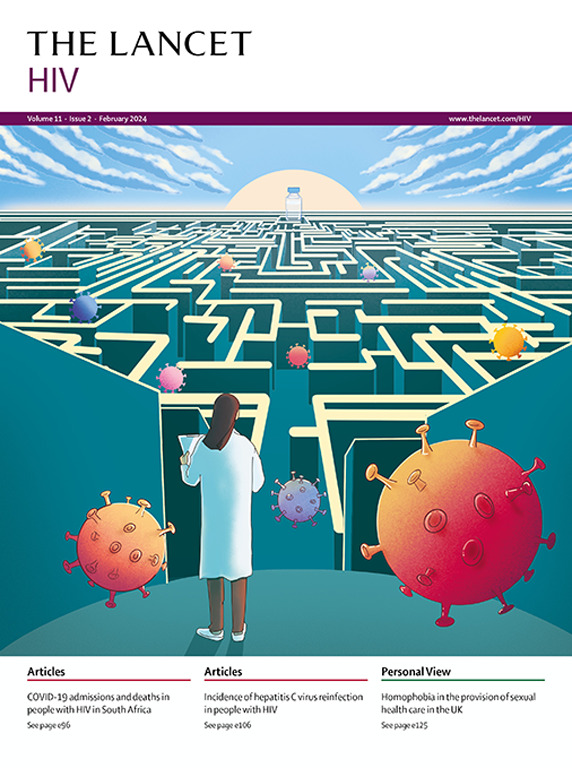支持重新参与和持续参与艾滋病毒护理的研究框架。
IF 13
1区 医学
Q1 IMMUNOLOGY
引用次数: 0
摘要
在全球范围内,到2024年,所有艾滋病毒感染者中有87%知道自己的艾滋病毒状况,在了解自己的状况并接受治疗的人中,94%的病毒受到抑制。随着在实现艾滋病规划署95-95-95目标方面取得进展,艾滋病毒方面的主要公共卫生挑战之一是优化护理的连续性,并有效地使失去护理的人重新参与。在各种环境中,高达40-50%的艾滋病毒感染者脱离了艾滋病毒护理。推迟或停止艾滋病毒治疗可在个人层面对健康结果产生负面影响,包括增加病毒血症和死亡率,并增加艾滋病毒在社区层面持续传播的风险。除了关注持续保留和重新参与的艾滋病毒研究缺乏外,还存在方法上的差距,妨碍了我们更好地理解和干预的能力。这一观点强调了对脱离参与和重新参与相关概念进行更细微区分的重要性,强调了在数据协调与促进证据生成和协作的灵活性之间取得平衡,强调了确定和测试重新参与干预措施的重要性。制定一项全球研究议程,连同方法指导,将有助于协同和有意地朝着重新参与的全面方法迈进。本文章由计算机程序翻译,如有差异,请以英文原文为准。
A research framework to support re-engagement and continuous engagement in HIV care.
Globally, in 2024, 87% of all people living with HIV knew their HIV status, and among people aware of their status and on treatment, 94% were virally suppressed. As progress is being made to reach the UNAIDS 95-95-95 targets, one of the key public health challenges for HIV lies in optimising continuity of care and effectively re-engaging people out of care. Across settings, up to 40-50% of individuals diagnosed with HIV are disengaged from HIV care. Delaying or discontinuing HIV treatment can negatively affect health outcomes at the individual level, including increasing viraemia and mortality, and increases the risk for ongoing HIV transmission at the community level. In addition to the scarcity of HIV research focusing on continuous retention and re-engagement, there are also methodological gaps interfering with our ability to better understand and intervene. This Viewpoint emphasises the importance of more nuanced distinctions of concepts related to disengagement and re-engagement, balancing data harmonisation with flexibility to facilitate evidence generation and collaboration, and identifying and testing re-engagement interventions. Developing a global research agenda, along with methodological guidance, would assist in moving synergistically and intentionally towards a comprehensive approach to re-engagement.
求助全文
通过发布文献求助,成功后即可免费获取论文全文。
去求助
来源期刊

Lancet Hiv
IMMUNOLOGYINFECTIOUS DISEASES&-INFECTIOUS DISEASES
CiteScore
19.90
自引率
4.30%
发文量
368
期刊介绍:
The Lancet HIV is an internationally trusted source of clinical, public health, and global health knowledge with an Impact Factor of 16.1. It is dedicated to publishing original research, evidence-based reviews, and insightful features that advocate for change in or illuminates HIV clinical practice. The journal aims to provide a holistic view of the pandemic, covering clinical, epidemiological, and operational disciplines. It publishes content on innovative treatments and the biological research behind them, novel methods of service delivery, and new approaches to confronting HIV/AIDS worldwide. The Lancet HIV publishes various types of content including articles, reviews, comments, correspondences, and viewpoints. It also publishes series that aim to shape and drive positive change in clinical practice and health policy in areas of need in HIV. The journal is indexed by several abstracting and indexing services, including Crossref, Embase, Essential Science Indicators, MEDLINE, PubMed, SCIE and Scopus.
 求助内容:
求助内容: 应助结果提醒方式:
应助结果提醒方式:


